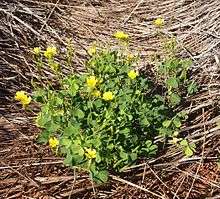Oxalis corniculata
| Oxalis corniculata | |
|---|---|
 | |
| Scientific classification | |
| Kingdom: | Plantae |
| (unranked): | Angiosperms |
| (unranked): | Eudicots |
| (unranked): | Rosids |
| Order: | Oxalidales |
| Family: | Oxalidaceae |
| Genus: | Oxalis |
| Species: | O. corniculata |
| Binomial name | |
| Oxalis corniculata L. | |
Oxalis corniculata, the creeping woodsorrel, also called procumbent yellow-sorrel[1] or sleeping beauty, resembles the common yellow woodsorrel, Oxalis stricta. It is a somewhat delicate-appearing, low-growing, herbaceous plant in the family Oxalidaceae. It has a narrow, creeping stem that readily roots at the nodes. The trifoliate leaves are subdivided into three rounded leaflets and resemble a clover in shape. Some varieties have green leaves, while others, like Oxalis corniculata var. atropurpurea, have purple. The leaves have inconspicuous stipules at the base of each petiole.
The fruit is a narrow, cylindrical capsule, 1 to 2 cm long and noteworthy for its explosive discharge of the contained, 1 mm long seeds.
Distribution
This species is cosmopolitan in its distribution, and its place of origin is unknown, but it is considered an Old World plant. It is regarded as weed in gardens,[2] agricultural fields, and lawns.[3]
Uses
The leaves of wood sorrel are quite edible, with a tangy taste of lemons. A drink can be made by infusing the leaves in hot water for about 10 minutes, sweetening and then chilling.[4] The entire plant is rich in vitamin C. Any wood sorrel is safe in low dosages, but if eaten in large quantities over a length of time can inhibit calcium absorption by the body.[4]
References
- ↑ "BSBI List 2007". Botanical Society of Britain and Ireland. Archived from the original (xls) on 2015-02-25. Retrieved 2014-10-17.
- ↑ Hackney, P. 1992. Stewart & Corry's Flora of the North-east of Ireland. Institute of Irish Studies The Queen's University of Belfast.
- ↑ UC Davis IPM
- 1 2 Lee Allen Peterson, Edible Wild Plants, Houghton Mifflin Company, New York City (1977), p. 104.
External links
| Wikimedia Commons has media related to Oxalis corniculata. |
| Wikibooks' A Wikimanual of Gardening has more about this subject: |